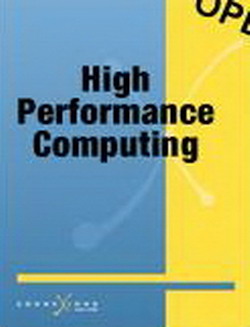
|
FreeComputerBooks.com
Links to Free Computer, Mathematics, Technical Books all over the World
|
|
- Title: High Performance Computing
- Author(s) Charles Severancen
- Publisher: O'Reilly Media; 2nd Edition; eBook (Creative Commons Licensed)
- License(s): Creative Commons License (CC)
- Paperback: 422 pages
- eBook: HTML, PDF, ePub, Kindle, etc.
- Language: English
- ISBN-10: 156592312X
- ISBN-13: 978-1565923126
- Share This:

|
The purpose of this book is to teach new programmers and scientists about the basics of High Performance Computing. Too many parallel and high performance computing books focus on the architecture, theory and computer science surrounding HPC. This book speaks to the practicing chemistry student, physicist, or biologist who need to write and run their programs as part of their research.
It presents techniques that address new performance issues in the programming of high performance computing (HPC) applications. Omitting tedious details, the book discusses hardware architecture concepts and programming techniques that are the most pertinent to application developers for achieving high performance. Even though the text concentrates on C and Fortran, the techniques described can be applied to other languages, such as C++ and Java.
About the Authors- Charles Severance is the associate director for advanced technology at the University of Michigan Media Union.
- Parallel Computing and Programming
- Algorithms and Data Structures
- Computational Complexity
- Computational and Algorithmic Mathematics

- High Performance Computing (Charles Severance)
- The Mirror Site (1) - PDF
- The Mirror Site (2) - PDF, ePub, Kindle, etc.
- Parallel Programming For Modern High Performance Computing Systems (Pawel Czarnul)
-
 Optimizing HPC Applications with Intel Cluster Tools
Optimizing HPC Applications with Intel Cluster Tools
This book takes the reader on a tour of the fast-growing area of high performance computing and the optimization of hybrid programs, focuses on optimization for clusters consisting of the Intel Xeon processor.
-
 High Performance Computing and Numerical Modelling
High Performance Computing and Numerical Modelling
This textbook provides a step-by-step approach to numerical methods in engineering modelling. It provides a consistent treatment of the topic, from the ground up, to reinforce for students that numerical methods are a set of mathematical modelling tools.
-
 Introduction to High-Performance Scientific Computing (Eijkhout)
Introduction to High-Performance Scientific Computing (Eijkhout)
This is a textbook that teaches the bridging topics between numerical analysis, parallel computing, code performance, large scale applications. it assumes a basic knowledge of numerical computation and proficiency in Fortran or C programming.
-
 High Performance Computing For Dummies, Sun & AMD Edition
High Performance Computing For Dummies, Sun & AMD Edition
This book is intended for anyone who has heard about the many benefits of using HPC (such as streamlining processes or saving money). This book explains what HPC is and shows how it can help you or others within your company.
-
 Is Parallel Programming Hard? If So, What Can You Do About It?
Is Parallel Programming Hard? If So, What Can You Do About It?
It examines what makes parallel programming hard, and describes design techniques that can help you avoid many parallel-programming pitfalls. It is primarily intended for low-level C/C++ code, but offers valuable lessons for other environments as well.
-
 Introduction to Parallel Computing (Blaise Barney)
Introduction to Parallel Computing (Blaise Barney)
This book explains how to design, debug, and evaluate the performance of distributed and shared-memory programs. It teaches students how to compile, run and modify example programs. It is a complete end-to-end source of information on almost all aspects.
-
 The Practice of Parallel Programming (Sergey A. Babkin)
The Practice of Parallel Programming (Sergey A. Babkin)
This book provides an advanced guide to the issues of the parallel and multithreaded programming. It goes beyond the high-level design of the applications, into the details that are often overlooked but vital to make the programs work.
-
 Notes on Theory of Distributed Systems (James Aspnes)
Notes on Theory of Distributed Systems (James Aspnes)
This book rovides a comprehensive source of material on the principles and practice of distributed computer systems and the exciting new developments based on them, using a wealth of modern case studies to illustrate their design and development.
-
 Parallel Computing Works! (Geoffrey C. Fox, et al.)
Parallel Computing Works! (Geoffrey C. Fox, et al.)
A clear illustration of how parallel computers can be successfully applied to large-scale scientific computations. This book demonstrates how a variety of applications were implemented on real parallel computers to produce new scientific results.





